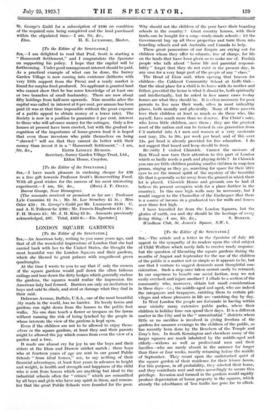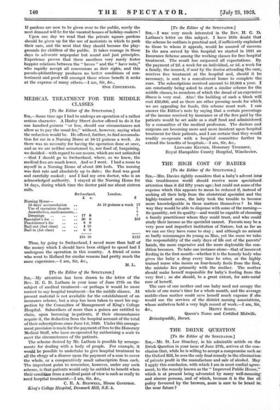[To the Editor of- the SPECTATOR.] Sin,—The article and a
letter in the Spectator of July 4th appeal to the sympathy of its readers upon the vital subject of Child Welfare which rarely fails to receive ready response; but the question of liberating the square gardens during the months of August and September for the use of the children of the public is a matter not•so simple as it appears to be, but one that I venture to suggest demands most thoughtful con- sideration. Such a step once taken cannot easily be retraced. In our eagerness to benefit one social faction, may we not easily overlook and injure another ? I allude to a section of the community who, moreover, obtain but small consideration in these days—i.e., the middle-aged and aged, who are indeed the ratepayers and taxpayers, entitling them to certain pri- vileges and whose pleasures in life are vanishing day by day.
In West London the people are fortunate in having within near vicinity many extensive public parks, where their children in holiday time can spend their days. It is a different matter in the City and in the " unresidential " districts where little or no sacrifice is involved in giving freedom of the gardens for summer evenings to the children of the public, as has recently been done by the Benchers of the Temple and Gray's Inn. In South Kensington and elsewhere many of the larger squares are much inhabited by the middle-aged and elderly—widows as well as professional men and their families—who arc rarely absent in the summer for longer than three or four weeks, mostly returning before the middle of September. They count upon the undisturbed quiet of the square garden of their residence for their leisure hours. For this purpose, in all probability, they selected their home, and they contribute rent and rates accordingly to secure this privilege. Invasion and turmoil in the gardens would rapidly produce depreciation of house property in the squares, which already the admittance of 'bus traffic has gone far to effect. If gardens are now to be given over to the public, surely the next demand will be for the vacated houses of holiday-makers !
Upon one day we read that the private square gardens should be given up for the use of motorists in which to park their cars, and the next that they should become the play- grounds for children of the public. It takes courage in these days to advocate unpopular but sound and just principles. Experience proves that these sacrifices very rarely foster happier relations between the " haves " and the " have nots," who rapidly accept all concessions as their rights, and this pseudo-philanthropy produces no better conditions of con- tentment and good will amongst those whose benefit it seeks at the expense of many others.—I am, Sir, &c., ONE CONCERNED.



























































 Previous page
Previous page